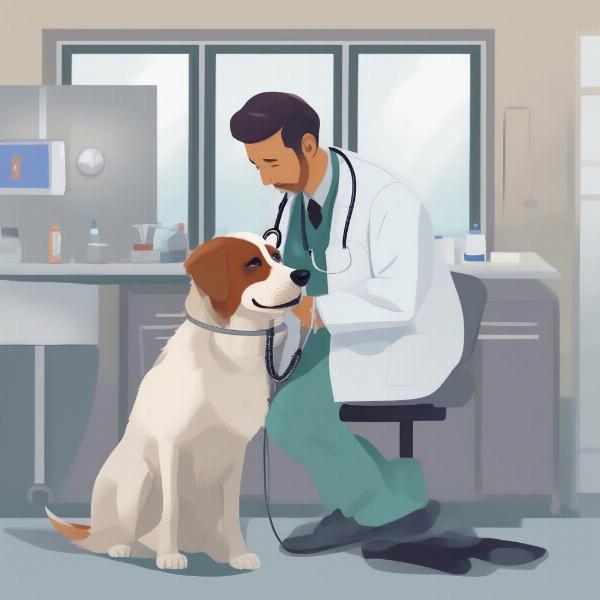Merit badge dog care encompasses a wide range of responsibilities, from understanding different breeds to providing proper nutrition and training. Whether you’re a seasoned dog owner or just starting out, this guide provides practical advice and expert insights to help you navigate every aspect of caring for your canine companion.
Understanding Dog Breeds and Choosing the Right One
Choosing the right breed is crucial for a harmonious relationship. Consider your lifestyle, living space, and experience level. A high-energy breed like a Border Collie might not be suitable for apartment living, while a low-maintenance breed like a Cavalier King Charles Spaniel could be a perfect fit. Researching breed-specific traits, health predispositions, and grooming requirements is essential.
Essential Health and Medical Care for Dogs
Regular veterinary checkups are vital for preventative care. Vaccinations, parasite prevention, and dental hygiene are key components of maintaining your dog’s health. Be aware of common health issues in your dog’s breed and watch for any changes in behavior or appetite. Early detection and treatment can significantly improve your dog’s quality of life.
 Dog at Vet Checkup
Dog at Vet Checkup
Mastering Dog Training and Behavior
Training is an ongoing process that builds a strong bond and ensures a well-behaved companion. Positive reinforcement methods, using rewards and praise, are highly effective. Start with basic obedience commands like sit, stay, and come. Consistency and patience are crucial for success. Addressing behavioral issues early on, such as excessive barking or destructive chewing, can prevent them from becoming ingrained habits.
Nutrition and Feeding Your Dog
Providing a balanced diet is essential for your dog’s overall health and well-being. Choose high-quality dog food appropriate for your dog’s age, breed, and activity level. Avoid feeding table scraps, as many human foods can be toxic to dogs. Freshwater should always be available. Consult your veterinarian for personalized dietary recommendations.
Grooming and Hygiene for a Happy Dog
Regular grooming keeps your dog clean, comfortable, and healthy. Brushing helps remove loose hair and prevents mats. Bathing frequency depends on breed and lifestyle. Nail trimming, ear cleaning, and dental care are also essential aspects of grooming.
Exercise and Activities for a Stimulated Dog
Regular exercise is crucial for both physical and mental stimulation. Daily walks, playtime, and interactive games help prevent boredom and destructive behaviors. Tailor the type and intensity of exercise to your dog’s age, breed, and health condition.
Caring for Puppies: A Special Responsibility
Puppies require extra care and attention. Focus on socialization, house training, and basic obedience. Provide a safe and stimulating environment for exploration and play. Proper nutrition is vital for healthy growth and development.
Senior Dog Care: Providing Comfort and Support
Senior dogs often require specialized care. Adjust their diet and exercise routine to accommodate age-related changes. Provide comfortable bedding and support for mobility issues. Regular veterinary checkups are essential for managing age-related health conditions.
Traveling with Your Dog: Tips for a Smooth Journey
Planning ahead is key for stress-free travel with your dog. Ensure your dog is comfortable in a crate or carrier. Pack essentials like food, water, leash, and any necessary medications. Research pet-friendly accommodations and transportation options.
Choosing the Right Dog Products and Accessories
Selecting appropriate products and accessories enhances your dog’s comfort and safety. Choose a collar and leash that fit properly. Provide comfortable bedding and toys. Consider other accessories like crates, carriers, and grooming tools based on your dog’s needs.
Conclusion
Merit badge dog care involves a holistic approach to ensuring your dog’s well-being. From choosing the right breed to providing proper nutrition, training, and healthcare, every aspect plays a vital role in creating a happy and healthy life for your canine companion.
FAQ
- How often should I take my dog to the vet? Annual checkups are recommended for healthy adult dogs, while puppies and senior dogs may require more frequent visits.
- What is the best way to house train my puppy? Consistency, positive reinforcement, and a regular schedule are key to successful house training.
- What should I feed my dog? Choose high-quality dog food appropriate for your dog’s age, breed, and activity level. Consult your veterinarian for personalized recommendations.
- How much exercise does my dog need? Exercise needs vary depending on breed, age, and health condition. Aim for daily walks and playtime.
- How often should I groom my dog? Grooming frequency depends on breed and coat type. Regular brushing and occasional baths are generally recommended.
- What are some signs of illness in dogs? Changes in appetite, behavior, energy levels, or bowel movements can indicate illness.
- How can I make traveling with my dog easier? Plan ahead, pack essentials, and choose pet-friendly accommodations and transportation.
About ILM Dog
ILM Dog is your trusted source for expert advice and practical tips on all aspects of dog care, from breed selection and training to health, nutrition, and grooming. We offer comprehensive guides, product reviews, and valuable resources to help you provide the best possible care for your canine companion. Whether you’re a new dog owner or a seasoned pro, ILM Dog is here to support you every step of the way. Contact us at [email protected] or +44 20-3965-8624 for personalized guidance.